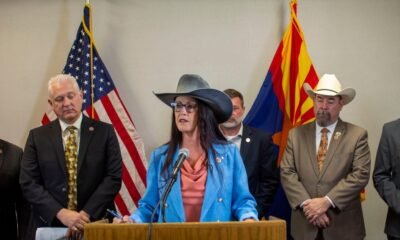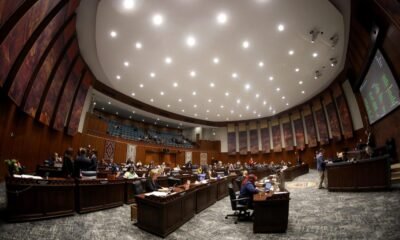Big Oil
Republicans Block California’s Tailpipe Emissions Standard, Hurdling Pollution Cuts for 40% of Americans

The U.S. Senate voted early Thursday to block California from enforcing its tailpipe emission regulations, impacting nearly 40% of Americans living in states that adopt California’s standards. This resolution, passed with a 51-46 vote, follows a similar measure approved by the House and now heads to President Donald Trump’s desk.
The vote saw Michigan Democrat Elissa Slotkin join Republicans in supporting a Congressional Review Act resolution that repeals EPA waivers allowing California to set its own vehicle emissions rules. These state policies aim to phase out sales of new gas-powered cars by 2035.
Democratic senators criticized the near-party-line decision, arguing it contradicted the Senate parliamentarian’s ruling, which stated that the EPA’s waivers couldn’t be revoked under the CRA. This act enables a simple majority to repeal recent executive rules, sidestepping the normal 60-vote legislative threshold.
The Biden administration had granted these waivers under a Clean Air Act provision, allowing California to impose stricter standards than those set by Congress in the 1970s. While no other state can impose independent standards, any can choose to adopt California’s regulations. Currently, 17 states and the District of Columbia have adopted some portion of California’s vehicle emissions rules.
Justin Balik, vice president at Evergreen Action, expressed concern over the ramifications of the Senate’s decision, highlighting the ensuing chaos and uncertainty for states nationwide. “What they’re doing is sowing a huge amount of chaos and uncertainty,” he stated in an interview.
Slotkin defended her vote, emphasizing her commitment to Michigan’s automotive sector and opposing what she termed an electric vehicle mandate. “I voted to prevent California from banning gas-powered cars by 2035,” she asserted, underlining her responsibility to the automotive industry.
Critics of the California regulations argue they limit consumer choice, effectively creating an electric vehicle mandate that overlooks consumer preferences. California makes up 11% of the national car market, amplifying its regulatory influence across the country.
Senate Republicans framed the 2035 deadline as an infringement on consumer freedom. John Barrasso, a leading Senate Republican, claimed victory for consumer choice and criticized Democrats for trying to force electric vehicles on Americans.
Advocates for California’s regulations countered, suggesting the Senate’s measure strips state policymakers of their decision-making power. Manish Bapna, president of the Natural Resources Defense Council, labeled the vote an alarming attack on state authority while also linking it to lobbying efforts from the oil industry.
The use of the Congressional Review Act provoked a strong backlash from Democrats and environmental allies, who warned it could destabilize the Senate’s procedural norms. Critics pointed out that the parliamentarian and the Government Accountability Office had indicated that the waiver couldn’t be repealed through this method.
Senate Majority Leader John Thune defended the approach, highlighting that the Senate must adapt its processes to address unique situations. He argued that the Senate historically resolves questions about its rules through a vote, emphasizing the necessity for legislative independence.
Critics denounced the process, asserting it dismantles a long-standing California-federal relationship regarding air quality standards. John Boesel of CALSTART described the Senate action as radical, predicting it would stall the advancement of clean transportation initiatives.
In the aftermath, lawsuits from California, along with several states following its lead, are anticipated, aiming to safeguard their regulatory authority. “The marketplace is now in unnecessary chaos,” Balik warned, underscoring the need for stability in industry regulations.


















